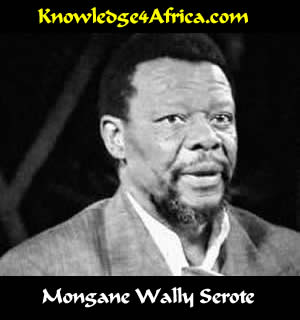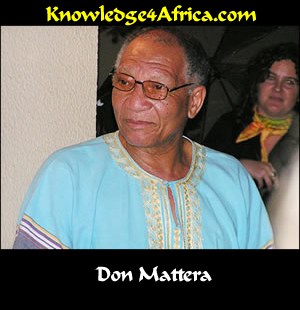|
READ THIS
This short work -- dedicated to the banned poet Don Mattera -- appears in the form of a
nature poem, describing the dry winter of the South African highveld, where the leaves fall from
the trees and everything becomes lifeless.
The poem is a vehicle, however, to show how the rule of the Whites in apartheid South Africa
will, like every sterile winter, eventually end -- to be followed by the dawn of a new spring.
 ABOUT THE POET
ABOUT THE POET
Mongane Wally Serote was born in Sophiatown in 1944. He grew up during the violent days
of the apartheid era and was arrested on a few occasions, even serving nine months in solitary
confinement in 1969 for an unspecified "crime", but was finally released without any
charges being brought against him.
In 1974 he was awarded the Fulbright scholarship which enabled him to study Fine Arts at the
Columbia University in New York. He returned to South Africa in 1979 but chose to go into self-
exile in Botswana, returning to South Africa only in 1990 with the collapse of the apartheid
system.
He is renowned for his poetry, although he has also written short stories and a couple of novels.
His work has won him several awards.
"Don M." refers to the poet Don Mattera who was "banned" for nearly nine years
from 1973 to 1982. "Banning" meant that the person was not allowed to attend
functions, speak in public, attend any public ceremonies or visit friends, or even leave a specific
area.
For three of those years, the poet was also under "house arrest", i.e. he was made a
prisoner in his own house, forbidden to leave the grounds for whatever reason.
If a person was banned or placed under house arrest, there was no recourse to law. One could
not challenge it -- nor did the banning authorities have to prove anything or even produce any
evidence to justify their decision.
Have you looked at the questions
in the right column?
|
TEST YOURSELF!
Read the left column and then answer
the following questions:
"it is a dry white season"
- Three times the poet repeats the statement, "it is a dry white season". What is the
metaphorical meaning of this "dry white season"? (4)

[Need help?]
Literally, the "dry white season" would be winter on the South African highveld, when
everything turns dry and the grass becomes almost white because of the frost.
The poet, however, uses this as a metaphor to depict the political situation in which Don M.
finds himself. The "white" season refers to the political landscape where the Whites
ruled South Africa.
It was dry for the Black people because there was no metaphorical water for them -- they were
wasting away under an intolerable system.
|
"dark leaves don't last, their brief lives dry out
and with a broken heart they dive down gently headed for the earth
not even bleeding."
- What does the poet mean by his reference to the "dark leaves"? (4)

[Need help?]
The poet uses the term "dark leaves" as a metaphor for the Black people. In the White
South African winter, the Black people did not survive. Often their lives were indeed short, cut
off by the brutal state regime. Metaphorically, their spirits too were dead, their hearts were
broken.
|
- Why do the dark leaves' "brief lives dry out" and fall gently "with a broken
heart"? (4)

[Need help?]
There were no opportunities allowed for Black people in the apartheid South Africa. Their lives
were very often brief, their lives -- when measured in terms of creativity -- were arid, and
were of hardship, pain and great loss.
|
- What is the significance of the words, "not even bleeding"? (4)

[Need help?]
Some of the Black people did indeed bleed -- people like Steve Biko who were tortured to
death by the state police. But others -- like Don M. -- were banned or placed under house
arrest. They did not bleed under torture but their spirit was destroyed. Or, at least, that was
the plan.
|
"only the trees know the pain as they still stand erect
dry like steel, their branches dry like wire"
- What does the poet mean when he says that "only the trees know the pain as they still
stand erect"? (4)

[Need help?]
Presumably the poet, in referring to "the trees", refers to those people who stood out
more in the political arena -- i.e. trees as opposed to leaves. Although they stood erect, they
would become the target of the oppressive regime to inflict even more pain and suffering. They
would be tortured -- often by means of truly brutal systems of torture.
|
"indeed it is a dry white season
but seasons come to pass."
- Are these words significant as an ending to the poem? Give your
reasons. (4)

[Need help?]
If the "dry white season" refers to the era of oppressive White political rule, then the poet
sees it as a season which will eventually be over. There is a tone of hope in the final line. All
seasons eventually pass on, to be followed by another season. The "dry white season"
of the South Africa political winter will eventually give way to spring and the promise of new
birth.
|
The poem is entitled, "For Don M. - Banned".
- What is the significance of a person being "banned" in apartheid South
Africa? (4)

[Need help?]
The significance of a person being "banned" in apartheid South Africa should have been
explained in the notes in the left column of this worksheet. Have you read them?
|
- Why does the poet never mention the person of Don M.? (4)

[Need help?]
The poet has, of course, mentioned Don M. in the title of this poem. He also refers to him in
the line, "it is a dry white season brother". The poet, however, is also speaking to all
people affected by the "dry white season", all those people suffering the physical and
mental torture of the apartheid regime. For this reason, the poet keeps his poem deliberately
vague -- although still dedicated to his friend, Don M.
|
The word "dry" is mentioned no less than six times in this brief eight-line poem.
- Is there any reason for this? (4)

[Need help?]
It must be there for emphasis, mustn't it? The word "dry" emphasises the winter of life,
a life devoid of growth, spiritless. Can you think of any other things that "dry" might
highlight?
|
Do you think there is any significance for the poem being written entirely in the
lower-case? (4)

[Need help?]
It is, of course, a modern phenomenon to write poetry without punctuation and using only the
lower-case.
On the other hand, such a gimmick is useful to the poet in putting across his message. Using
the upper-case makes the meaning perfectly clear. It gives definition. But the poet is speaking
about a time when it was dangerous to stand out, dangerous even to be a black leaf in an era
when only the white leaves were important. So the poet uses the lower-case to emphasise the
subservience of Black society.
|
|




